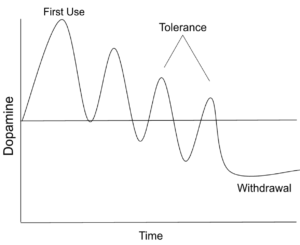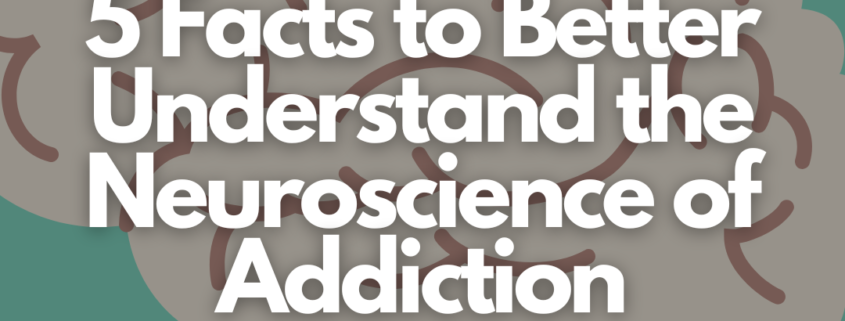5 Facts to Better Understand the Neuroscience of Addiction
Author: Sam DeFilippo, MS, LPC, NCC, CAADC
There are several theories on how to define addiction; some state that addiction is a “brain disease” while others consider it a “moral failing”. Addiction is a complex issue that is not easily explained by one theory, however, many theories agree that there is a neurobiological basis for addiction.
1. Addiction Hijacks the Brain’s Reward System
The brain’s reward system, heavily influenced by the neurotransmitter dopamine, usually reinforces pleasurable activities like exercising or spending time with family and friends. However, when substances are introduced the system becomes overwhelmed, flooding the brain with pleasure signals and creating a powerful drive to repeat the behavior. Over time, this creates an intense craving for the “dopamine rush” that the addictive substances provide. Individuals become addicted to the feeling they get after using substances, which is actually a result of increased dopamine levels in the brain.
2. Tolerance Means the Brain Becomes Less Sensitive to Pleasure
As individuals continue using substances, their brain’s reward system adjusts by becoming less responsive to dopamine. The brain starts to recognize that it is being provided with dopamine from an external source so it starts creating less and less, eventually relying solely on the substance to increase dopamine in the brain. This is called tolerance, meaning you need more of the substance to achieve the same feeling of pleasure. It’s not just a psychological desire—it’s a biological adaptation that makes it harder to feel pleasure from everyday experiences.
3. Addiction Changes Brain Structures and Function
Chronic addiction can lead to long-lasting changes in the brain, particularly in areas like the prefrontal cortex, which is responsible for decision-making and impulse control. Over time, this impairment makes it harder for individuals to resist cravings and regulate their behaviors, perpetuating the cycle of addiction.
4. Withdrawal Is Your Brain’s Dopamine Deficit
When a person stops using a substance, the brain experiences withdrawal—a condition where dopamine levels plummet. The brain has become so used to the individual providing it with dopamine through the use of substances that when the substances are removed, the brain “forgets” to create dopamine on its own. The discomfort, anxiety, and cravings associated with withdrawal are partly due to the brain’s struggle to return to its normal dopamine levels, making it a major barrier to recovery. Below is a graph to illustrate how dopamine levels change from the initial substance use to withdrawal.

5. Addiction Isn’t Just About Dopamine—Other Neurotransmitters Are Involved
While dopamine gets the spotlight, other neurotransmitters like glutamate, serotonin, and endorphins also play key roles in addiction. Glutamate strengthens memories of addictive behaviors, while serotonin affects mood, and endorphins are responsible for the “high” people get from substances like opioids. Together, they make addiction a complex and multi-faceted issue. When an individual stops using substances it can take months or even years for their brain to return to baseline levels of functioning and in some cases, the brain may never fully recover. This is why early intervention and education are crucial in helping individuals prevent long term harm caused by substance use.
If you or someone you know is struggling with substance abuse or addiction, Equilibria’s Addiction Recovery Center of Excellence could be a good place to begin the process of recovery.
Equilibria is a group of licensed mental health professionals in Pennsylvania and New Jersey with multiple specialties to serve all aspects of our diverse community’s mental, emotional, and behavioral needs. We provide in person and telehealth services to individuals of all ages, families, and those in relationships. Click here to schedule an appointment today.


